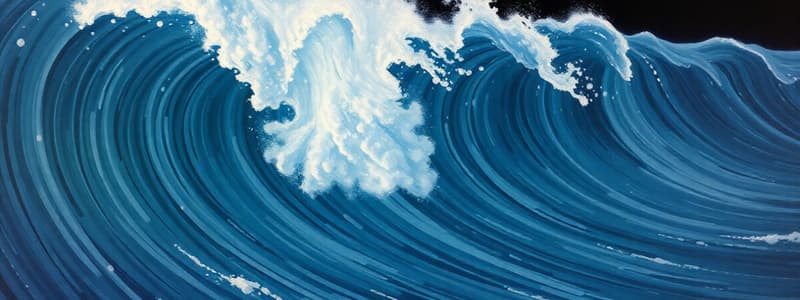Podcast
Questions and Answers
What happens to the pitch of sound as a source moves closer to an observer?
What happens to the pitch of sound as a source moves closer to an observer?
- It becomes higher as it approaches. (correct)
- It remains constant.
- It becomes lower as it approaches.
- It decreases steadily.
Which of the following best describes the Doppler effect?
Which of the following best describes the Doppler effect?
- The spreading out of sound waves in a stationary medium.
- A phenomenon that affects only light waves.
- Change in frequency due to temperature variations.
- Change in frequency as a sound source moves relative to an observer. (correct)
What factor does NOT affect the speed of sound in a medium?
What factor does NOT affect the speed of sound in a medium?
- Density of the medium.
- Color of the medium. (correct)
- Temperature of the medium.
- Humidity of the medium.
What is a key characteristic of sound waves?
What is a key characteristic of sound waves?
How does the intensity of a sound wave change as the source moves away from an observer?
How does the intensity of a sound wave change as the source moves away from an observer?
What is frequency in wave motion?
What is frequency in wave motion?
If the wavelength ($λ$) is measured in meters and frequency ($f$) in Hertz, what is the unit for speed ($V$)?
If the wavelength ($λ$) is measured in meters and frequency ($f$) in Hertz, what is the unit for speed ($V$)?
What occurs when waves encounter a solid barrier?
What occurs when waves encounter a solid barrier?
What phenomenon explains how we can hear sounds around corners?
What phenomenon explains how we can hear sounds around corners?
What describes the time taken for one cycle of a wave?
What describes the time taken for one cycle of a wave?
When two waves converge, how is their effect combined?
When two waves converge, how is their effect combined?
What defines the maximum displacement of a wave from its rest position?
What defines the maximum displacement of a wave from its rest position?
What is the relationship between the speed of wave propagation (V), wavelength ($λ$), and frequency ($f$)?
What is the relationship between the speed of wave propagation (V), wavelength ($λ$), and frequency ($f$)?
What is the outcome when two sine waves of identical amplitude and frequency are overlaid?
What is the outcome when two sine waves of identical amplitude and frequency are overlaid?
What happens when two sine waves are exactly half a phase out of synchronisation?
What happens when two sine waves are exactly half a phase out of synchronisation?
In the context of interference phenomena, what do bright bands on a screen indicate?
In the context of interference phenomena, what do bright bands on a screen indicate?
What are the points on a standing wave where the amplitude is zero called?
What are the points on a standing wave where the amplitude is zero called?
Which statement correctly describes standing waves?
Which statement correctly describes standing waves?
What is the term for the point of maximum amplitude in a standing wave?
What is the term for the point of maximum amplitude in a standing wave?
During interference of waves, dark bands indicate what phenomenon?
During interference of waves, dark bands indicate what phenomenon?
What is the relationship between a fundamental wave and harmonic waves in the context of standing waves?
What is the relationship between a fundamental wave and harmonic waves in the context of standing waves?
What is the frequency of Middle C on the piano?
What is the frequency of Middle C on the piano?
What determines the quality or timbre of a sound?
What determines the quality or timbre of a sound?
What type of wave motion involves the transfer of energy through an elastic medium without the medium moving in the direction of the energy transfer?
What type of wave motion involves the transfer of energy through an elastic medium without the medium moving in the direction of the energy transfer?
At what approximate speed does sound travel in air under normal conditions?
At what approximate speed does sound travel in air under normal conditions?
Which characteristic of sound relates to the perceived frequency of the sound?
Which characteristic of sound relates to the perceived frequency of the sound?
What is the critical rotor speed for a tail boom with a natural frequency of 1 Hz?
What is the critical rotor speed for a tail boom with a natural frequency of 1 Hz?
What happens if two sounds have frequencies that are reasonably close?
What happens if two sounds have frequencies that are reasonably close?
What allows sound waves to be classified as compression waves?
What allows sound waves to be classified as compression waves?
What category does an aircraft flying faster than the speed of sound fall under?
What category does an aircraft flying faster than the speed of sound fall under?
What phenomenon occurs when a sound wave is observed at a different frequency due to the movement of the source or observer?
What phenomenon occurs when a sound wave is observed at a different frequency due to the movement of the source or observer?
If the intensity of sound is increased by a factor of 10, how much does the sound level in decibels change?
If the intensity of sound is increased by a factor of 10, how much does the sound level in decibels change?
What phenomenon occurs when an aircraft reaches the speed of sound?
What phenomenon occurs when an aircraft reaches the speed of sound?
Which of the following factors does NOT affect the speed of sound?
Which of the following factors does NOT affect the speed of sound?
Which of the following affects the speed of sound in a medium?
Which of the following affects the speed of sound in a medium?
What is the pitch of a sound determined by?
What is the pitch of a sound determined by?
How does the intensity of sound change with distance from the source?
How does the intensity of sound change with distance from the source?
What type of wave motion is characterized by movement that can be graphically represented as a sine wave?
What type of wave motion is characterized by movement that can be graphically represented as a sine wave?
How do disturbances created by an aircraft traveling at the speed of sound behave?
How do disturbances created by an aircraft traveling at the speed of sound behave?
Which frequency represents a fundamental note, as mentioned in the content?
Which frequency represents a fundamental note, as mentioned in the content?
In the context of wave motion, what is a key feature of standing waves?
In the context of wave motion, what is a key feature of standing waves?
What resonant frequency must be avoided in addition to the fundamental for the tail boom?
What resonant frequency must be avoided in addition to the fundamental for the tail boom?
Which of the following statements is true about light waves compared to sound waves?
Which of the following statements is true about light waves compared to sound waves?
What is the sound intensity level (IL) in decibels if the intensity is $10^{-5}$ Watts/m²?
What is the sound intensity level (IL) in decibels if the intensity is $10^{-5}$ Watts/m²?
What phenomenon do pilots experience when propellers run at slightly different RPMs?
What phenomenon do pilots experience when propellers run at slightly different RPMs?
Flashcards
Wave Motion
Wave Motion
The transfer of energy through an elastic medium by a periodic disturbance.
Mechanical Waves
Mechanical Waves
Waves that require a medium to travel, like sound waves in air or water waves.
Sinusoidal Wave Motion
Sinusoidal Wave Motion
A wave whose displacement can be represented by a sine function, with repeating crests and troughs.
Longitudinal Waves
Longitudinal Waves
Signup and view all the flashcards
Compressions
Compressions
Signup and view all the flashcards
Rarefactions
Rarefactions
Signup and view all the flashcards
Amplitude
Amplitude
Signup and view all the flashcards
Interference
Interference
Signup and view all the flashcards
Wavelength
Wavelength
Signup and view all the flashcards
Frequency
Frequency
Signup and view all the flashcards
Period
Period
Signup and view all the flashcards
Wave Equation
Wave Equation
Signup and view all the flashcards
Refraction
Refraction
Signup and view all the flashcards
Diffraction
Diffraction
Signup and view all the flashcards
Constructive Interference
Constructive Interference
Signup and view all the flashcards
Destructive Interference
Destructive Interference
Signup and view all the flashcards
Standing Wave
Standing Wave
Signup and view all the flashcards
Nodes
Nodes
Signup and view all the flashcards
Antinodes
Antinodes
Signup and view all the flashcards
Fundamental Wave
Fundamental Wave
Signup and view all the flashcards
Harmonic Waves
Harmonic Waves
Signup and view all the flashcards
Fundamental Frequency
Fundamental Frequency
Signup and view all the flashcards
Overtone
Overtone
Signup and view all the flashcards
Resonance
Resonance
Signup and view all the flashcards
Resonance Damage
Resonance Damage
Signup and view all the flashcards
Beat Frequency
Beat Frequency
Signup and view all the flashcards
Sound Intensity
Sound Intensity
Signup and view all the flashcards
Sound Pitch
Sound Pitch
Signup and view all the flashcards
Sound Quality (Timbre)
Sound Quality (Timbre)
Signup and view all the flashcards
Harmonics
Harmonics
Signup and view all the flashcards
Speed of Sound
Speed of Sound
Signup and view all the flashcards
Mach Number
Mach Number
Signup and view all the flashcards
Supersonic
Supersonic
Signup and view all the flashcards
Sonic Boom
Sonic Boom
Signup and view all the flashcards
Subsonic
Subsonic
Signup and view all the flashcards
Shock Wave
Shock Wave
Signup and view all the flashcards
Doppler Effect
Doppler Effect
Signup and view all the flashcards
Sound Barrier
Sound Barrier
Signup and view all the flashcards
Study Notes
Wave Motion
- Wave motion is the transfer of energy through a medium, characterized by periodic disturbance.
- Energy is transferred, but the medium itself doesn't move in the direction of energy transfer.
- Movement occurs perpendicular, between minimum and maximum amplitudes of displacement.
Sinusoidal Wave Motion
- Sinusoidal wave motion follows the pattern of a sine wave.
- Sine waves are graphical representations of angular sine values.
- Compression and longitudinal waves are pulses that create compressions and rarefactions through a medium.
- Sound waves are compression waves, using the mechanical action of molecules for transfer.
- Sound waves cannot travel through a vacuum, unlike light waves, which are not mechanical.
Interference Phenomena (Superposition)
- Wave effects are superimposed algebraically.
- Overlaying identical sine waves of the same frequency results in a wave with double the amplitude.
- Different phase waves can cancel each other out.
- Constructive interference is when waves combine to amplify each other.
- Destructive interference is when waves combine and cancel out each other.
- Interference patterns are evident in the constructive and destructive interference of light, shown on a screen through slits.
Standing Waves
- Standing waves form when a fundamental wave interferes with a harmonic wave, creating a new wave.
- These waves result from waves traveling in opposite directions, converging and thus creating interference patterns.
- Nodes in standing waves have zero amplitude.
- Antinodes have maximum amplitude in these wave patterns.
- Harmonics are multiples of the fundamental wave's frequency.
Resonance Damage
- Objects have natural frequencies.
- A forced vibration, when frequencies match natural frequency, increases amplitude dramatically.
- This can cause damage to mechanical systems.
- Tail booms, blades, and general mechanics must be checked for avoiding resonance issues.
Beats
- Sound waves with close frequencies create beat frequencies by interference.
- The beat frequency is the difference in the frequencies.
- This is a result of the varying amplitude of the interference.
- Twin engine aircraft propellers create noticeable "thrumming" when they run at mismatched RPMs.
Sound Intensity
- Sound intensity is determined by the amplitude of a sound wave.
- High amplitude means louder sound.
- It's measured in decibels (dB).
- Intensity levels of everyday sounds vary greatly.
- Intensity decreases with the square of distance from the source.
Sound Pitch
- Pitch is determined by the frequency of the sound wave.
- Higher frequencies correspond to higher pitch.
- Human hearing range is ~20Hz - 20,000Hz.
Sound Quality ("Timbre")
- Quality or "timbre" is how a sound is characterized.
- Dependent on the nature of harmonics present.
- Harmonics have numerical values determined by multiples of the fundamental frequency.
- Instruments have distinctive sounds due to their unique harmonic relationships.
Speed of Sound
- Speed depends on the medium's elasticity and temperature.
- Speed is greater in denser mediums.
- Normal atmospheric conditions at sea level mean speed ~340 m/s.
Mach Number
- Mach number is used at high speeds.
- A ratio of aircraft speed over local speed of sound.
- Aerodynamic forces are dependent on the Mach number.
- Local speed of sound is about 39√T (T being the temperature in Kelvin)
Doppler Effect
- Doppler effect occurs when a sound source moves relative to a listener.
- Perceived frequency changes as source moves toward or away.
- Sound becomes louder before and then decreases as the source passes by.
Conclusion
- Summary of learned topics and capabilities.
- Recap of key points of wave motion, frequency, and sound.
Studying That Suits You
Use AI to generate personalized quizzes and flashcards to suit your learning preferences.




